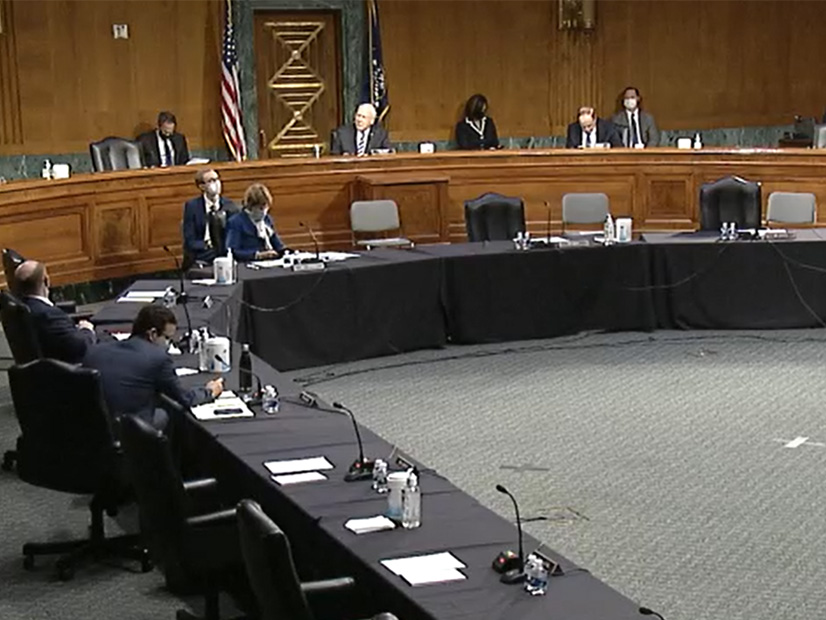Republican senators on Tuesday grilled members of President Biden’s cabinet over the president’s proposed $2.3 trillion infrastructure plan, saying it is too broad and too expensive.
The exchanges over Biden’s American Jobs Plan came at the first meeting of the full Senate Appropriations Committee since Democrats took control of the upper house. The proposal includes investments in rural broadband service and tax credits to spur electric transmission, solar power, energy storage and carbon capture technology. (See Biden Infrastructure Plan Would Boost Clean Energy.)
Committee Chair Patrick Leahy (D-Vt.) opened the hearing by beseeching his Republican colleagues to join with Democrats in enacting the bill, calling it a “once-in-a-generation opportunity” to rebuild the nation’s infrastructure and “begin to chop away at the long-ignored climate issues.
“It’s not a question of whether or not we take this opportunity. It’s necessary for our future that we do so,” he said. The issues are “all connected, not just by roads and bridges.”
He said the U.S. is spending only 2.3% of GDP on infrastructure, a 60-year low and half that of Europe. “We can’t continue our position as the leader of the global stage by thinking small.
“This is the Senate Appropriations Committee. I know all of you. You’re all friends. I think the world of you,” he said. “Let’s set aside partisan rancor. Let’s work together as this committee has so many times over our history and agree on the bold step we need at this time.”
Vice Chair Sen. Richard Shelby (R-Ala.) said he was happy the committee was holding hearings on the bill after being “sidelined” during passage of Biden’s COVID-19 relief bill.
“I believe there is broad bipartisan agreement on the need for investment in our nation’s crumbling infrastructure. But the breadth of that support, I think, depends on how broadly the term infrastructure is defined. For me that is a simple question for today’s hearing. What kind of investments can we agree fall into the category of infrastructure? I believe most people associate the term with roads, with bridges, airports, transportation … water systems, sewage systems and the like,” he said. “The administration’s proposal, on the other hand is so broad — and ambiguous in areas — that it seems there is little, if anything they do not consider … infrastructure.”
‘Visionary Infrastructure’

Transportation Secretary Pete Buttigieg defended the administration’s proposed spending on EVs and charging networks.
“Much has been said about the term ‘traditional’ infrastructure,” he said. “But America’s greatest tradition of visionary infrastructure investments has always included decisions that expand the horizon. The interstate highway system might not have been considered traditional infrastructure at one time. Railroads were not traditional infrastructure until we built them.”
Shelby told Commerce Secretary Gina Raimondo he was concerned that rather than help the U.S. compete with China the bill would emulate the Communist regime by “providing massive subsidies to grow domestic manufacturing capabilities in certain segments of the economy.”
Raimondo said the U.S. faced a “crisis” in its supply chain, citing as an example the lack of domestic production of semiconductor chips. She said the bill would require private companies to invest at least $4 for every $1 in spending by the government.
“I can tell you from experience that investments like this work,” she said. “When I became governor of Rhode Island we had the highest unemployment rate in the country. During my administration, we made infrastructure and workforce investments like those this package calls for, and before the COVID-19 pandemic, Rhode Island had the lowest unemployment rate in a generation.”
Sen. Susan Collins (R-Maine) said Biden’s proposal conflicts with the “fix it first” policy Buttigieg cited as the Transportation Department’s philosophy for prioritizing spending. She said the administration’s proposal would spend $174 billion supporting electric vehicles and only $157 billion “on roads, bridges, ports, airports and waterways combined.
“It’s certainly appropriate to look ahead and accommodate newer and cleaner modes of transportation,” she said. “But what the administration is doing is spending billions more on subsidies related to electric vehicles than on the roads and bridges on which they will travel.”
Buttigieg said roads and bridges also have other sources of funding but that EVs need government support to provide a foundation for growth. “The U.S. aviation sector might not have blossomed the way it did if not for New Deal-era investments in airports across the country,” he said.
‘Not Enough’

Sen. John Kennedy (R.-La.) pressed EPA Administrator Michael Regan on how much the bill would impact climate change. He cited a comment by Le Yucheng, China’s vice minister of foreign affairs, who told The Associated Press that it was “not very realistic” for other nations to expect China, which is responsible for 28% of carbon emissions, to do more on climate change.
“They’re not going to participate. We’re going to spend $2.3 trillion; a lot of it is climate change,” Kennedy said.
“I’m not sure I take the statement at face value,” Regan responded. “China is investing a lot of money in renewable energy and battery storage and being globally competitive in the very areas that this Job bill” seeks to improve.
After repeated questioning, Regan acknowledged that the administration had no climate modeling on the impact of the Jobs package alone.
Kennedy also asked Raimondo why Biden hadn’t asked cabinet officials to “scrub” their budgets for savings before he proposed a $1.5 trillion discretionary budget that would boost non-defense discretionary spending by 16%. (See Biden Budget Seeks Major Spending Hikes on Climate.)
“We’re all going through our budgets every day and looking for ways that we can be more efficient,” Raimondo said. “But the truth of it is we need an investment.”
“How much money do you think you’re going to reduce your budget?” Kennedy pressed.
“I don’t have a great answer to that at the moment,” Raimondo responded. “But I can promise you it’s not enough — we’re not going to save our way out of decades of underinvestment in R&D and in infrastructure.”










